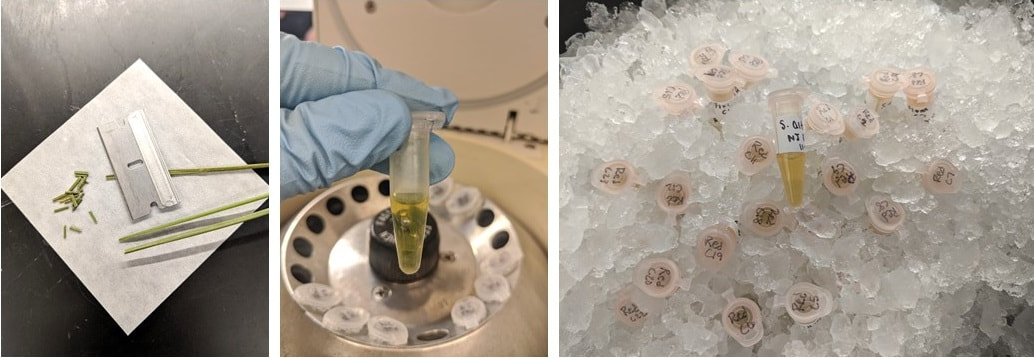COMMUNITY GENETICS
Finding repeatable causal drivers of biodiversity has been challenging for ecologists because systems vary markedly across time and space. My doctoral and postdoctoral research in the newly emerging field of community genetics culminated in one of the first sets of studies to demonstrate that genetic diversity in plant producers extended to affect diversity at higher trophic levels (Wimp et al. 2004, Ecology Letters; Wimp et al. 2005, Evolution). Along with my collaborators, I repeatedly advocated for a “community genetics” approach to community ecology (Whitham et al. 2003, Ecology; Whitham et al. 2005, Ecoscience; Whitham et al. 2006, Nature Reviews. Genetics). My work helped to establish the foundation of this field, including: 1) the impacts of plant genetics on keystone herbivores (Wimp and Whitham 2001, Ecology; Schweitzer et al. 2005, Oikos; Wimp and Whitham 2007, Ecological Communities: Plant Mediation in Indirect Interaction Webs), 2) the scalability of community genetics from individual trees (Wimp et al. 2005, Evolution) to stand-level (Wimp et al. 2004, Ecology Letters) and regional (Bangert et al. 2006a, Molecular Ecology; Bangert et al. 2008, Heredity) scales, 3) the stability of community associations (Shuster et al. 2006, Evolution), 4) the role of host plant chemistry as a mechanism linking plant genetics and arthropod diversity (Bangert et al. 2006b, Molecular Ecology; Meneses et al. 2012, Ecoscience; Wimp et al. 2007, Molecular Ecology), and 5) the role of plant hybrids as a force shaping arthropod evolution (Jarvis et al., 2017, Ecology and Evolution). I am now working with collaborators to examine similar questions on willow, where we found that genetic differences in host plant phenology affect pollination (Simon et al. 2021, Ecology and Evolution), and are using Genome-Wide Association Studies (GWAS) to map community traits. GWAS will advance the field of community genetics by specifically pinpointing the host plant genomic regions that impact arthropod community phenotypes (Wimp et al. 2019, Molecular Ecology).
The connection between plant genetics and the dependent arthropod community is not only relevant to ecological and evolutionary theory, but also to conservation. We worked with the Lower Colorado River Multi-Species Conservation Program (a >$600 million ecosystem restoration program managed by the U.S. Bureau of Reclamation) in order to restore riparian areas reclaimed from agriculture with genetically diverse Fremont cottonwoods, and determine how diverse plantings impact critical ecosystem services (Fischer et al., 2017, Functional Ecology).
I have also extended my community genetics research to the East Coast Salt Marsh Ecosystem where two species of grass (Spartina alterniflora and Spartina patens) are the dominant, habitat-forming plants. I worked with my former graduate student, Jewel Tomasula (an NSF-GRFP recipient), and Matt Hamilton (Associate Professor, Georgetown) to examine stress gradients that affect natural genetic variation in S. alterniflora. To examine how genetic variation in turn affects ecosystem processes and arthropod community structure, we have created common gardens with low to high levels of genetic variation.
While S. alterniflora is able to withstand the increased tidal inundation that results from an increase in sea level rise, the high marsh grass (S. patens) is not and its overall habitat size is decreasing. In collaboration with Matt Hamilton, we have sequenced the S. patens genome and developed microsatellite markers. My graduate student, Vanessa Morales, is now examining how genetic variation in S. patens may increase resilience to sea level rise and nutrient inputs. Moreover, she is examining how genetic diversity in S. patens affects associated biodiversity and ecosystem processes.
The connection between plant genetics and the dependent arthropod community is not only relevant to ecological and evolutionary theory, but also to conservation. We worked with the Lower Colorado River Multi-Species Conservation Program (a >$600 million ecosystem restoration program managed by the U.S. Bureau of Reclamation) in order to restore riparian areas reclaimed from agriculture with genetically diverse Fremont cottonwoods, and determine how diverse plantings impact critical ecosystem services (Fischer et al., 2017, Functional Ecology).
I have also extended my community genetics research to the East Coast Salt Marsh Ecosystem where two species of grass (Spartina alterniflora and Spartina patens) are the dominant, habitat-forming plants. I worked with my former graduate student, Jewel Tomasula (an NSF-GRFP recipient), and Matt Hamilton (Associate Professor, Georgetown) to examine stress gradients that affect natural genetic variation in S. alterniflora. To examine how genetic variation in turn affects ecosystem processes and arthropod community structure, we have created common gardens with low to high levels of genetic variation.
While S. alterniflora is able to withstand the increased tidal inundation that results from an increase in sea level rise, the high marsh grass (S. patens) is not and its overall habitat size is decreasing. In collaboration with Matt Hamilton, we have sequenced the S. patens genome and developed microsatellite markers. My graduate student, Vanessa Morales, is now examining how genetic variation in S. patens may increase resilience to sea level rise and nutrient inputs. Moreover, she is examining how genetic diversity in S. patens affects associated biodiversity and ecosystem processes.

